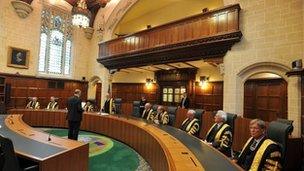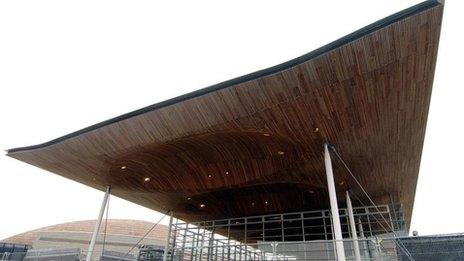£300,000 on Supreme Court constitutional cases
- Published

Supreme Court judges have twice ruled in the Welsh government's favour
More than £300,000 has been spent by the Welsh and UK governments on three Supreme Court cases about assembly powers, the BBC has learned.
The court ruled for the Welsh government in two on which it spent under half the £160,000 the UK government did.
There has been no judgement yet in the third which cost the Welsh government nearly £70,000 and the UK one £2,000.
The Welsh government said it shows the devolution settlement needs reform.
The figures were obtained through a Freedom of Information request by BBC Wales' Welsh-language website, Cymru Fyw.
Legality
In July, the Supreme Court ruled Welsh ministers can protect the wages of 13,000 farm workers, following the dispute over who has the power to set minimum wages.
The total cost for the Welsh government was £38,573, while the UK government spent £87,538.
The first time the Supreme Court upheld the legality of a bill passed by the Welsh assembly was in November 2012.
The attorney general had claimed the Local Government Byelaws Bill which allows Welsh councils to make those laws went beyond devolved powers.
The Welsh government's costs amounted to £30,097, the UK government's £73,300.
Judgement has not yet been handed down following the referral of the Recovery of Medical Costs for Asbestos Diseases (Wales) Bill to the Supreme Court.
'Clarification'
The bill passed by AMs would make firms reimburse the NHS for workers needing treatment after exposure to asbestos.
The Welsh government's law officer had asked the Supreme Court to decide whether the assembly has the power to pass the legislation because the insurance industry says the bill goes beyond its law-making powers.
The case has cost the Welsh government £69,769, while the UK government spent £2,075 after the attorney general decided not to take part.
A spokesperson for his office said: "The government looks carefully at all legislation passed by the National Assembly for Wales to ensure it is within the assembly's legislative competence.
"Where the government feels it is necessary, it is right that we obtain clarification of the devolution settlement from the Supreme Court, following the process that the Government of Wales Act clearly sets out".
The costs incurred in these cases are "monitored and kept as low as possible to ensure the best value for money is achieved".
A Welsh government spokesperson said: "The fact that Bills passed by our democratically-elected assembly run the risk of being challenged - with all the costs and uncertainty that causes - is evidence that the current devolution settlement urgently needs reform."
- Published9 July 2014

- Published17 July 2013

- Published21 November 2012

- Published11 December 2013
